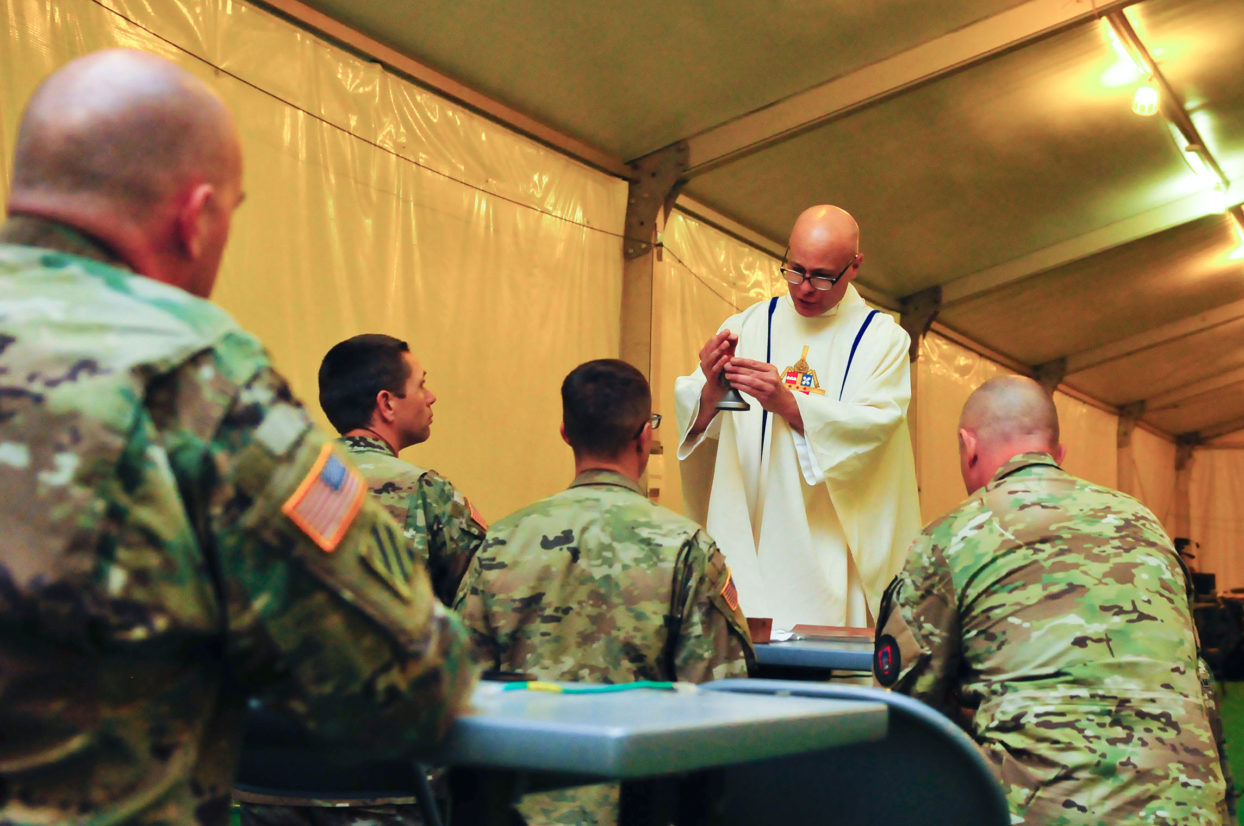Father Brownell of St. Patrick Parish in Morristown is called to serve
By Staff Sgt. Timothy Cordeiro/Tennessee Army National Guard
Lt. Col. Gary Anderson, the Battalion Chaplain for the Tennessee National Guard’s 30th Combat Sustainment Support Battalion, believes that the Chaplain Corps is much more important to the military than most people realize. Anderson, a Lawrenceburg, Tenn. native, is now on his twenty-seventh year of Army service with the Chaplain Corps, and has made it his life’s mission to support Soldiers in their time of need.
“My dad was a prison chaplain,” said Anderson. “When I was a kid, I used to watch a military show and one of the Soldiers was having some issues. The First Sergeant said he was going to get the Chaplain. I was all excited thinking what was he going to do? How was he going to help?”
Later on, after a series of other events later in life, Anderson made the decision to join the Army as a Chaplain, in 1992. “This is what God has been preparing me for my whole life,” thought Anderson.
Anderson is currently at the National Training Center in Fort Irwin, Calif. administering chaplain services to members of the Tennessee Army National Guard’s 278th Armored Cavalry Regiment. The Soldiers are currently participating in a number of complex training exercises in preparation for upcoming deployments to Europe.
More than 2,000 feet above sea level, NTC is a 1,000 square mile Army training facility isolated in the Mojave Desert. The NTC is designed to challenge training units with hybrid threats of peer-opposing insurgent forces, as well as complex scenarios riddled with social, ethical, and moral dilemmas, designed to mimic what units will likely face while deployed.
The 278th ACR, based predominantly out of Tennessee and Pennsylvania, is comprised of roughly 3,000 Soldiers, dispersed through 6 squadrons, to include armor, field artillery and mechanized infantry companies. Anderson, with his small team, is here trying to help as many Soldiers as possible.
“Even George Washington would pray a lot before engaging in combat,” said Anderson. “There’s no such thing as an atheist in a foxhole. These Soldiers are going to be experiencing some tough conditions and trying times, so we are here to help in any way we can.”
An environment like this, however, presents challenges for chaplains during training. “There are so many moving parts,” said Anderson. “Everybody has different timelines and schedules and there isn’t a lot of free time, so getting the word out that we are here providing services can be a challenge.”
Alongside Lt. Col. Anderson, as part of the Unit Ministry Team, is Maj. Patrick Brownell, the Brigade Chaplain for Tennessee’s 230th Sustainment Brigade, who is also here doing his part.
“Chaplains should be dispensers of hope and optimism,” said Brownell, a 13-year Army Chaplain from Morristown, Tenn. “Our mission is to perform or provide. If we can’t meet a Soldiers request for a service, we will do whatever we can to provide that service.”
Both Anderson and Brownell know the importance of being visible so the Soldiers here feel comfortable coming forward with any issues they may be having. “If I do my job well, anyone should feel they are free to believe in whatever they want,” said Brownell. “We are not here to discriminate or to pass judgment, just to ensure the constitutional rights and religious protections of all Soldiers.”
Though challenging at times, the Chaplain Corps is also very rewarding explains Anderson. “I like being able to minister to hurting people,” said Anderson. “It feels good to be able to give a Soldier some attention when he or she desperately needs it.”
Brownell, like Anderson, also referred to George Washington in regards to the history of the Chaplain Corps.
“Washington used to describe what kind of traits and values a chaplain should have, even as far down as expressing that hay should be afforded to the chaplain’s horse,” said Brownell. “The Chaplain Corps is one of the oldest in the Army and that says a lot for its importance.”
Even if the training makes things a little more difficult, and the environment makes ministering a bit more complicated, it goes to show that the Chaplain Corps will be there for their Soldiers under any circumstances.
“There’s an old story of a young boy who was trying to roll a big rock across the backyard,” explained Anderson. “He wasn’t getting very far, when his father comes out and asks ‘Hey, son, are you using all of your resources?’ to which the boy replied, ‘I think so, dad,’ and he kept on pushing. Struggling again, the dad asks the same question, to which the boy replied with the same answer. Until finally the father gets sick of watching his son struggle and says, ‘Son, you didn’t ask me for help. You’ve got to use all of your resources.’ And they went on to roll the big rock across the yard. That story is a lot like the Chaplain Corps and the Army; you’ve got us Chaplains as a resource, so when there’s training like this going on, you might as well use us.”

